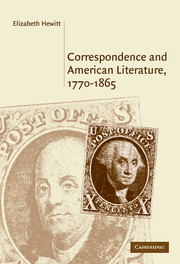Conclusion: Whitman's universal letters
Published online by Cambridge University Press: 22 September 2009
Summary
Given that the letter is a primary technology of union (the literary form whose function is to congregate aggregates) and given that from ratification to secession the epistolary mode was so frequently used to describe an American politics dedicated to managing union, we might expect that the poet of national union would likewise be invested in letter-writing as both practice and metaphor. After all, the inaugurating sentences of Walt Whitman's 1855 Leaves of Grass seems to offer a condensation of what we have seen to be Ralph Waldo Emerson's epistolary theory: “I celebrate myself, and sing myself / And what I assume you shall assume, / For every atom belonging to me as good belongs to you.” Whitman's celebration of radical individualism is aligned with his celebration of communal identity and, thus, his “assumption” seems to depend on the very same presumption that characterizes the political work of the letter, which likewise functions to make identity and distinction (proximity and distance) commensurate.
We might also presume a certain affinity between Whitman's Leaves of Grass and the epistolary mode given his poem's sustained employment of the second-person address that likewise characterizes familiar letters. When, for example, Whitman describes his intimate relationship to us in “Song of Myself” (“This hour I tell things in confidence, I might not tell everybody, but I will tell you” [45]), the conceit would seem to be that we are addressed as the recipient of a private and intimate document.
- Type
- Chapter
- Information
- Correspondence and American Literature, 1770–1865 , pp. 173 - 187Publisher: Cambridge University PressPrint publication year: 2004

